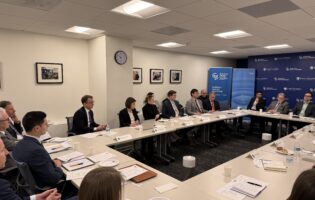A German-American Dialogue of the Next Generation
The eight participants of the Business & Economics Program group came together for a second virtual meeting on January 26, 2017. The discussion focused on future challenges for the American and European economies under the new U.S. administration. Among the issues the group confronted was the question of what an “America First” approach means to the U.S. and European economies, how transatlantic economic relations will be affected, why multilateral cooperation is more important now than ever, and the effectiveness of the German G20 presidency in 2017. The group developed various policy recommendations that are scheduled to be presented at the final conference on March 30-31, 2017.
In the wake of adjusting to a new administration, the United States and EU face uncertainty on what influences the “America First” economic approach will have on a larger scale. While the United States is turning away from trade agreements with the EU, this brings ambivalence to how the global market will be affected. The group established four main policy issues:
- trade,
- financial market regulations,
- international cooperation, and
- messaging strategy.
The issue of trade has become a very sensitive subject within EU-U.S. relations because of President Trump’s open criticism of multilateral trade agreements and the EU as a whole. While the UK already expresses great interest in becoming a strong U.S. trade ally, many fear future frictions with the rest of the EU. To counteract this bilateral trend, participants suggested that rather than overreacting to possible economic trends, the economy within the EU should be strengthened in order to become a more valuable trade partner in the future. Furthermore, experts voiced that Germany has taken a very strong stance against many of the new administration’s positions and recommend that antagonistic reactions should be held to a minimum, while focusing energy on defending their own values and keeping an open dialogue with different channels of the administration. Besides expressing concerns about the bilateral trade direction the United States is moving toward, participants stated their uncertainty of how to find allies and channels within the new administration to open a dialogue in the future. There was general agreement that energy would be put on strengthening networks and finding contacts in Congress and trying to analyze further legal options businesses could take. They expressly agreed on the important role businesses play for transatlantic relations in the future, due to the fact that the U.S. Cabinet is strongly business-oriented.
Additionally, the experts emphasized the importance of reaching out to the general public to clarify the fact that protectionism would have a negative impact on global markets. Awareness should be spread about manufacturing jobs being lost due to technological advances, rather than the misconstrued idea of immigrants or globalization damaging the economy and taking away jobs. Global supply chains and German business hiring tactics should be explained to the public. For this to carry weight, concrete figures and examples of German business contributions to the U.S. job market should be prepared.
On the issue of financial regulations, there was general consensus that regulatory guidelines are likely to be loosened. On this issue, common ground should be found on both sides of the Atlantic and repercussions analyzed and presented. Many old models of market and financial regulation are being thrown out in the new administration’s policies, and currently, markets are responding positively despite high risk. The question is whether these strong markets and looser regulations are sustainable domestically and internationally.
With U.S. economic trends moving away from working multilaterally, international cooperation will be a recurring theme over the next four years. Experts agreed that while there is still a lot of uncertainty for the future of transatlantic relations, the main focus point of the G20 should be stressing the importance of an international rule-based system and the correlated benefits.
Beyond the G20 and the role of experts, the group agreed that many transatlantic policy organizations have become reactionary rather than proactive with all the blustering of the new administration. The wave of populism in the United States and Europe is in part due to frustration with establishment and political elite. Just as important as the policy is how and to whom it is presented. Policy practitioners should adopt a clear, strong, and serious tone that allows for dissent and diverse voices. The “elite” should also seek ways to present the value of the transatlantic relationship beyond Berlin and the beltway, making the German-American relationship more accessible to everyday citizens.







